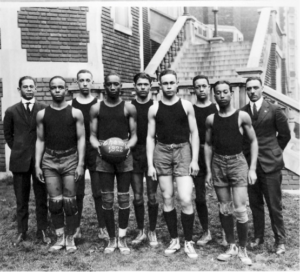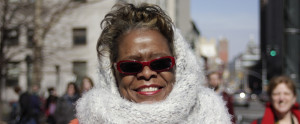For the second year in a row, every acting nominee is white. It is the first time that there have been two straight years of all-white nominees since 1995 to 1996, just three years after I was born. Jesse Jackson called for a boycott of the 1996 ceremony. This year stars like Will Smith and Jada Pinkett Smith have taken similar stands.
My stand comes not in response to theirs. Instead, as a young black man, my decision not to watch this year’s ceremony is a culmination of a journey I have taken with the Oscars and with Hollywood itself. Unfortunately, Hollywood continues to perpetuate a system that erases people of color from the movies and offers little financial backing for minority filmmakers and stories, and I just can’t take it anymore.
I wasn’t aware of this system in 2002 when I first watched the Oscars. I was 9 years old and was already telling my parents, “Movies are my life!”
In 2002, “The Lord of the Rings: The Fellowship of the Ring” was up for 13 awards. “The Matrix,” “Star Wars” and Roger Ebert helped plant the seeds of passion in my mind. But the Oscars added water. My favorite movie of the year was up for 13 awards! I couldn’t believe it. For a 9-year-old with mostly 9-year-old tastes, this was a big deal. Not only did the Oscar nominations validate something I loved, it seemed to validate my love for movies.
As movies became more and more a part of my life, the Oscar telecast did, too. It became my Super Bowl. I recall memorable moments of years past: Adrien Brody planting a big wet kiss on a shocked Halle Berry when he won Best Actor for “The Pianist” in 2003, “The Return of the King’s’” clean sweep in 2004, Cate Blanchett’s blink-and-you-miss-it look of embarrassment at her scenery-chewing Oscar clip for “Elizabeth: The Golden Age” in 2008. I get caught up in the so-called Oscar race, trying to predict who will win. When I first predicted all the major categories correctly in 2009, I expanded from there to include the smaller categories like Documentary Short and Animated Short. Last year, I got 19 of 24 correct.
Although I won’t be watching this year’s broadcast, I wrote out my predictions anyway: Brie Larson wins Best Actress for her heartbreaking work in “Room,” Emmanuel Lubezki makes history as the first cinematographer to win an Oscar three years in a row for his epic camerawork in “The Revenant,” and Sylvester Stallone garners a Best Supporting Actor trophy for breathing new life into a battered 40-year-old icon in “Creed.”
But I don’t plan to watch the Academy Awards to see if my predictions come true. This year, I was reminded once too often that, as a black man, my love affair with film is often a one-way street.
Now, having made my way through my teen years into my early twenties, I know a thing or two about unrequited love. If you’re lucky, the target of your affections knows you exist. You can get a wave, a “Hi, how are you,” a smile just for you if you’re really, really lucky. I’ve gotten all three and can remember the foolish hope they filled me with. I’ve even hung out with my crush, expressed my affection in gifts and poems, and waxed lyrical about her to my friends. I stuck around with my nose to the air, sniffing for signs that my feelings would be returned, seeing in every look and every kind word a sign that maybe, just maybe, things might change.
They didn’t, and neither have the movies. Each year, most movies I love and admire remind me that they don’t love me back. The diverse casts and directors of films like “Creed,” “Furious 7” or “Selma” are little more than pecks on the cheek from my crush. I can offer my crush gifts (in the form of hard-earned cash) talk about it with my friends, or write about it here, but when I go see Todd Haynes’s “Carol” or the latest Coen Brothers film, as far as the directors and producers are concerned, I am not in the audience. I do not exist.
What a thing that is: to have your existence or the reason for your existence questioned by the things you love. The Coens casually voiced their apathy towards me in an interview in “The Daily Beast,” casting aside suggestions that they might consider diversity in their overwhelmingly white movies.
“You don’t sit down and write a story and say, ‘I’m going to write a story that involves four black people, three Jews, and a dog,’— right?” Joel Coen said.
This sentiment echoes feelings voiced by Woody Allen in 2014 when he told the “New York Observer” that he’d only hire a black actor if a role required one. After all, you can’t just be black in Woody Allen’s Manhattan. There must be a reason. Like Sidney Poitier in “Guess Who’s Coming to Dinner,” being black must be essential to the story. But I went to Howard University. There, thousands of students walk on campus without needing a reason to be black or human beings. They just are.
Woody Allen and the Coens have made some of my favorite films, but their considerable imaginations do not extend to black kids at Howard. And they’re not the only ones. Those leaked emails of Sony producers Amy Pascal and Scott Rudin placed President Obama’s taste in movies on a spectrum that ranged from Kevin Hart to “Django Unchained.” If the people paying to get movies made can caricaturize the humanity of the leader of the free world, something is broken.
The Oscars put this broken system on display year in and year out. That system, already bad for blacks, is even worse for Latinos, Asians and Native Americans. Judging from recent articles predicting a repeat of this year’s whitewash in 2017, things don’t look to be improving.
I find myself looking back to 1947. My grandmother was about my age. She, too, was an avid moviegoer. Around this time in ‘47, she would be listening to “The Best Years of Our Lives” win Best Picture and Fredric March Best Actor on the radio, triumphing over Christmas perennial “It’s a Wonderful Life” and every man Jimmy Stewart.
My grandmother has been dead for 40 years, but if she were alive, she would look at this year’s nominees and shrug: today’s movies aren’t much different from the Hollywood movies of the 1940s, she might say. The wonderful lives or not so wonderful lives on screen usually don’t include people of color. Over time, Jimmy Stewart of “It’s a Wonderful Life” has been succeeded by Tom Hanks of “Bridge of Spies.” The every man is still a white man.
“The Martian,” “The Revenant,” and hundreds of other movies are Valentine’s Day cards to white moviegoers.
Until I consistently get a Valentine, the Oscars don’t deserve my affection. Nevertheless, one day I hope to write about film for a living. If that happens, I will probably find myself at the Academy Awards on assignment. I hope by then there are more people of color in front of and behind the cameras in Hollywood, and more journalists of color writing about movies and other aspects of the arts.
Until then, I cannot allow my movie crush to continue to hurt me so. The Academy is taking small steps to alleviate this burden, but it’s small consolation, a tease really. So Sunday night, consider this one-sided romance on break.


